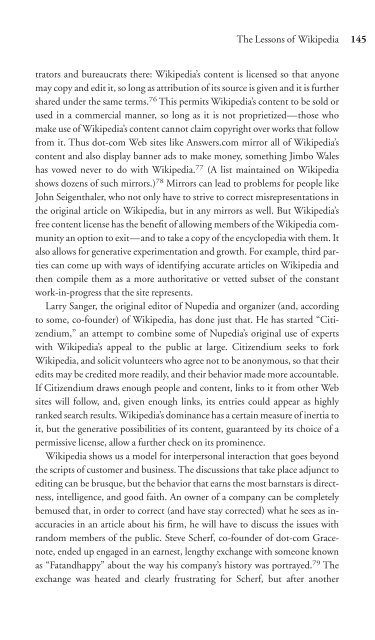Download - Future of the Internet â And how to stop it.
Download - Future of the Internet â And how to stop it.
Download - Future of the Internet â And how to stop it.
You also want an ePaper? Increase the reach of your titles
YUMPU automatically turns print PDFs into web optimized ePapers that Google loves.
The Lessons <strong>of</strong> Wikipedia 145<br />
tra<strong>to</strong>rs and bureaucrats <strong>the</strong>re: Wikipedia’s content is licensed so that anyone<br />
may copy and ed<strong>it</strong> <strong>it</strong>, so long as attribution <strong>of</strong> <strong>it</strong>s source is given and <strong>it</strong> is fur<strong>the</strong>r<br />
shared under <strong>the</strong> same terms. 76 This perm<strong>it</strong>s Wikipedia’s content <strong>to</strong> be sold or<br />
used in a commercial manner, so long as <strong>it</strong> is not proprietized—those who<br />
make use <strong>of</strong> Wikipedia’s content cannot claim copyright over works that follow<br />
from <strong>it</strong>. Thus dot-com Web s<strong>it</strong>es like Answers.com mirror all <strong>of</strong> Wikipedia’s<br />
content and also display banner ads <strong>to</strong> make money, something Jimbo Wales<br />
has vowed never <strong>to</strong> do w<strong>it</strong>h Wikipedia. 77 (A list maintained on Wikipedia<br />
s<strong>how</strong>s dozens <strong>of</strong> such mirrors.) 78 Mirrors can lead <strong>to</strong> problems for people like<br />
John Seigenthaler, who not only have <strong>to</strong> strive <strong>to</strong> correct misrepresentations in<br />
<strong>the</strong> original article on Wikipedia, but in any mirrors as well. But Wikipedia’s<br />
free content license has <strong>the</strong> benef<strong>it</strong> <strong>of</strong> allowing members <strong>of</strong> <strong>the</strong> Wikipedia commun<strong>it</strong>y<br />
an option <strong>to</strong> ex<strong>it</strong>—and <strong>to</strong> take a copy <strong>of</strong> <strong>the</strong> encyclopedia w<strong>it</strong>h <strong>the</strong>m. It<br />
also allows for generative experimentation and growth. For example, third parties<br />
can come up w<strong>it</strong>h ways <strong>of</strong> identifying accurate articles on Wikipedia and<br />
<strong>the</strong>n compile <strong>the</strong>m as a more author<strong>it</strong>ative or vetted subset <strong>of</strong> <strong>the</strong> constant<br />
work-in-progress that <strong>the</strong> s<strong>it</strong>e represents.<br />
Larry Sanger, <strong>the</strong> original edi<strong>to</strong>r <strong>of</strong> Nupedia and organizer (and, according<br />
<strong>to</strong> some, co-founder) <strong>of</strong> Wikipedia, has done just that. He has started “C<strong>it</strong>izendium,”<br />
an attempt <strong>to</strong> combine some <strong>of</strong> Nupedia’s original use <strong>of</strong> experts<br />
w<strong>it</strong>h Wikipedia’s appeal <strong>to</strong> <strong>the</strong> public at large. C<strong>it</strong>izendium seeks <strong>to</strong> fork<br />
Wikipedia, and solic<strong>it</strong> volunteers who agree not <strong>to</strong> be anonymous, so that <strong>the</strong>ir<br />
ed<strong>it</strong>s may be cred<strong>it</strong>ed more readily, and <strong>the</strong>ir behavior made more accountable.<br />
If C<strong>it</strong>izendium draws enough people and content, links <strong>to</strong> <strong>it</strong> from o<strong>the</strong>r Web<br />
s<strong>it</strong>es will follow, and, given enough links, <strong>it</strong>s entries could appear as highly<br />
ranked search results. Wikipedia’s dominance has a certain measure <strong>of</strong> inertia <strong>to</strong><br />
<strong>it</strong>, but <strong>the</strong> generative possibil<strong>it</strong>ies <strong>of</strong> <strong>it</strong>s content, guaranteed by <strong>it</strong>s choice <strong>of</strong> a<br />
permissive license, allow a fur<strong>the</strong>r check on <strong>it</strong>s prominence.<br />
Wikipedia s<strong>how</strong>s us a model for interpersonal interaction that goes beyond<br />
<strong>the</strong> scripts <strong>of</strong> cus<strong>to</strong>mer and business. The discussions that take place adjunct <strong>to</strong><br />
ed<strong>it</strong>ing can be brusque, but <strong>the</strong> behavior that earns <strong>the</strong> most barnstars is directness,<br />
intelligence, and good fa<strong>it</strong>h. An owner <strong>of</strong> a company can be completely<br />
bemused that, in order <strong>to</strong> correct (and have stay corrected) what he sees as inaccuracies<br />
in an article about his firm, he will have <strong>to</strong> discuss <strong>the</strong> issues w<strong>it</strong>h<br />
random members <strong>of</strong> <strong>the</strong> public. Steve Scherf, co-founder <strong>of</strong> dot-com Gracenote,<br />
ended up engaged in an earnest, lengthy exchange w<strong>it</strong>h someone known<br />
as “Fatandhappy” about <strong>the</strong> way his company’s his<strong>to</strong>ry was portrayed. 79 The<br />
exchange was heated and clearly frustrating for Scherf, but after ano<strong>the</strong>r


